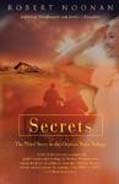 |
Secrets by Robert Noonan iUniverse
book review by Peter M. Fitzpatrick
"It's a gamble when you adopt a child, but what intrigues me most is—what secrets do some children have buried inside their hearts?"
Secrets is the third installment of Robert Noonan's orphan train series that follows the lieves of four American orphans rescued and shipped west to be adopted by the serendipitous method of displaying them at train stations to whoever might show up. Three of the four find happy homes, but still must struggle to overcome the upheaval and loss in their lives. Some have had to do dehumanizing things to stay alive before they were adopted. One has had to flee a sexual abusing adoptive father and fend for herself on the streets. The slow process of learning to trust and grow in stable and loving households is artfully rendered by the author, who seems to have an innate feel for the pulsations and tremors of family dynamics. Noonan portrays the adopting parent's motivations and needs with a deft hand as well. We come to understand the emotional dialogue—subtle and not-so-subtle—that emerges from the interactions of these disparate actors learning to exist under the uncertain rules of adoption circa 1900, America.
Over time, a bonding takes place between the orphans that is gradually recognized. This theme is expanded with the reappearance of Hillary, the orphaned child laborer who we met in the first novel of the series, Wildflowers. She has wound up in Galena, Illinois, not too far north from Newberry, where the four orphan train riders found homes. One of them, Pina, is another child laborer from the textile mill in Alton, Delaware, where Hillary worked. When Pina sees Hillary at a Scottish festival, connections are reestablished that unite all of the orphaned children and a great number of adopting parents from both Galena and Newberry. A new extended family of friends and relatives emerges organically as a metaphor for the power of community and shared experience. Secrets of painful pasts and uncertain futures are resolved by the renewing power of love and acceptance.
Noonan has given a nuanced and gently drawn portrait of the emergence of strong selfhood through the power of social cohesion. In this age of social fraction and widespread alienation, his message is both timely and full of instinctual wisdom.
